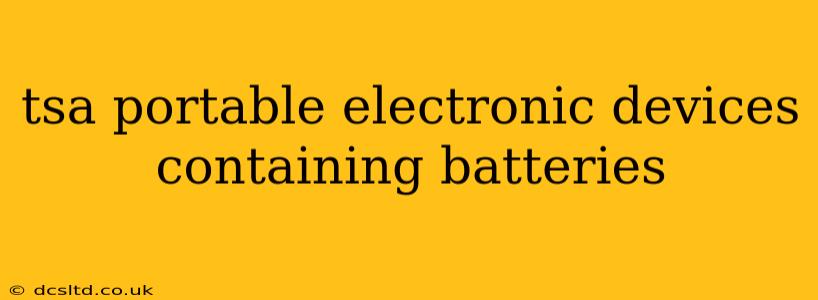Traveling with electronic devices can be stressful, especially when navigating Transportation Security Administration (TSA) regulations. Understanding the rules surrounding portable electronic devices, particularly those containing batteries, is crucial for a smooth journey. This guide will clarify TSA guidelines and answer common questions to alleviate your pre-flight anxieties.
What Electronic Devices Require Special Attention at TSA Checkpoints?
Many portable electronic devices contain batteries, making them subject to specific TSA screening procedures. This includes, but isn't limited to:
- Smartphones and Tablets: These are common items that often trigger additional screening due to their lithium-ion batteries.
- Laptops and Notebooks: Larger devices with more powerful batteries require extra scrutiny.
- E-readers: Devices like Kindles and others fall under the same guidelines as tablets.
- Portable Power Banks: These external chargers require careful packaging to prevent short circuits.
- Cameras and Camcorders: Depending on size and battery type, these may require extra screening.
- Gaming Devices: Portable gaming consoles and handheld devices need to follow the same rules as other electronics.
- Medical Devices: While many medical devices are allowed, you should always notify TSA officers beforehand and have appropriate documentation.
It's important to note that the specific regulations might change, so checking the TSA website before your trip is always recommended.
Can I Bring My Laptop in My Carry-On Bag?
Yes, you can generally bring your laptop in your carry-on bag. However, you will need to remove it from its case and place it separately in a bin for X-ray screening. This is a standard procedure to ensure proper security checks. Don't pack your laptop in checked baggage unless absolutely necessary, as it's more vulnerable to damage there.
What About Spare Batteries for My Electronics?
Spare batteries for your electronic devices must be carried in your carry-on baggage, not in checked baggage. They must be individually protected to prevent short circuits, often by placing them in their original packaging or using insulating tape to cover the terminals. Lithium-ion batteries are particularly sensitive and must be handled with care. Always check the TSA website for updated guidelines on the types and quantities of spare batteries allowed.
How Are Electronic Devices with Damaged Batteries Handled?
TSA agents are trained to identify potentially hazardous situations. If your device shows signs of battery damage (e.g., swelling, leakage, or visible damage), you may be asked to remove the battery or have the device further inspected. In some cases, the device may be prohibited from traveling if the battery presents a safety risk. It's crucial to ensure your device's battery is in good working order before you travel.
What Happens if My Electronic Device Triggers an Alarm?
If your electronic device triggers an alarm during screening, a TSA agent will conduct a secondary inspection. This may involve further physical examination or the use of additional screening technology. Cooperate fully with the agent, and be prepared to answer questions about your device.
Are There Size Restrictions on Electronic Devices?
While there aren't specific size restrictions for most electronic devices, excessively large or unusual items may require additional scrutiny. It's always better to err on the side of caution and avoid bringing oversized devices if possible.
What Should I Do if I Have a Medical Electronic Device?
Passengers with medical electronic devices, such as insulin pumps or CPAP machines, should notify TSA officers beforehand and have proper documentation to ensure a smooth process. The TSA website has dedicated information for travelers with disabilities and medical conditions.
Conclusion
Understanding TSA regulations regarding portable electronic devices with batteries is vital for stress-free travel. By following these guidelines, you can ensure a smooth and efficient security check experience. Always remember to check the official TSA website for the most up-to-date information before your trip. This will help you avoid any unexpected delays or issues at the airport. Remember that safety is paramount, and cooperation with TSA agents is essential for ensuring a secure travel experience for everyone.
